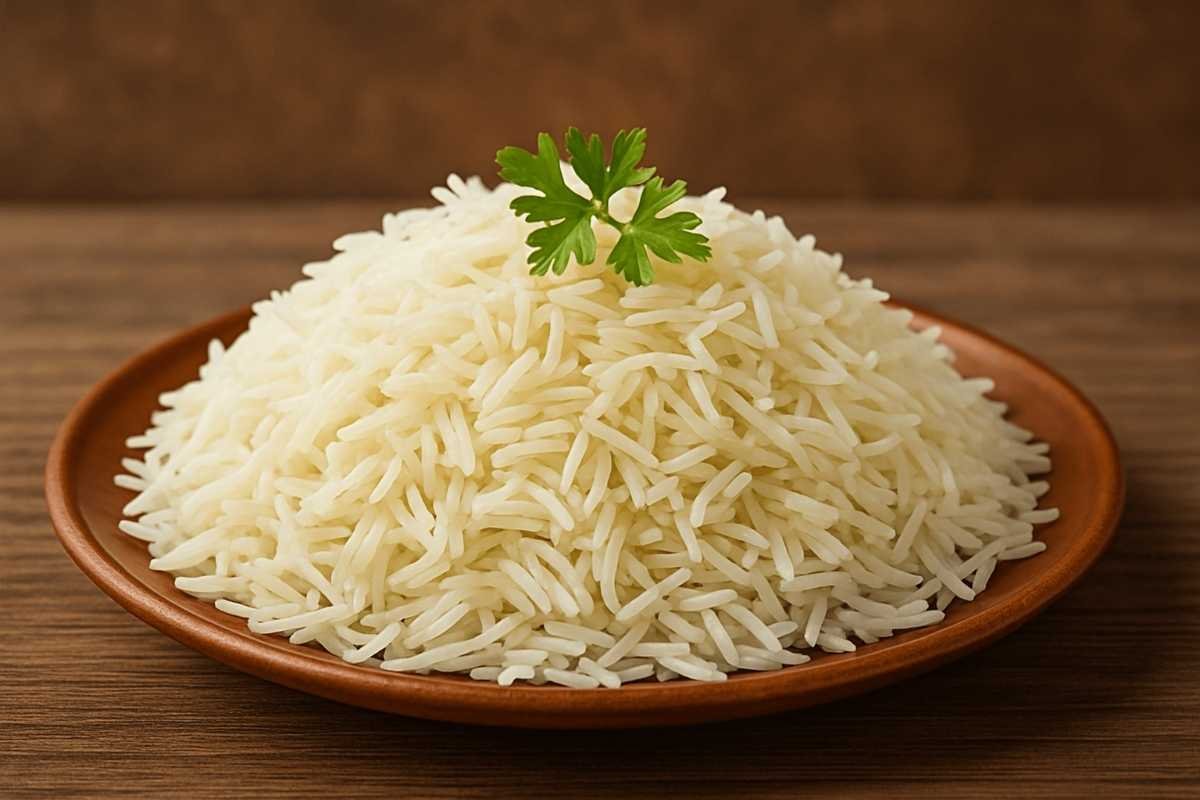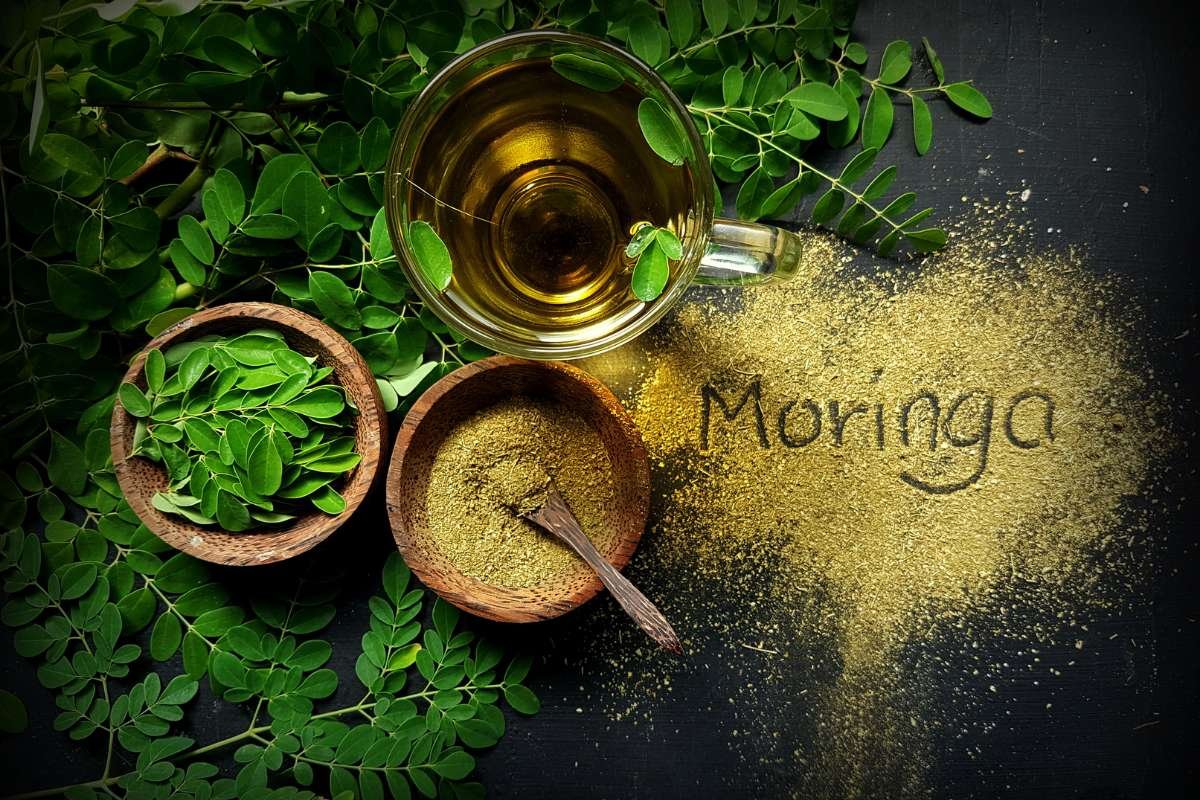Rice up your life with a pinch of wit. Imagine your plate wearing a bow-tie and saying: “Pick me, I’m charming and smart.” That plate invites you to ask: Is Basmati Rice Healthy? You smile, nod, and want the answer. This article champions that curious question. You’ll get facts clear as daylight. You’ll laugh at little jokes. You’ll feel pumped to make smart food picks. By the end, you’ll know if that fragrant, long-grained beauty earns its health trophy. Let’s find out why asking Is Basmati Rice Healthy? Makes sense and gives power to your pantry.
5 Nutrition Facts About Basmati Rice
Is Basmati Rice Healthy? Let’s break it down grain by grain and look at what’s really inside your bowl.
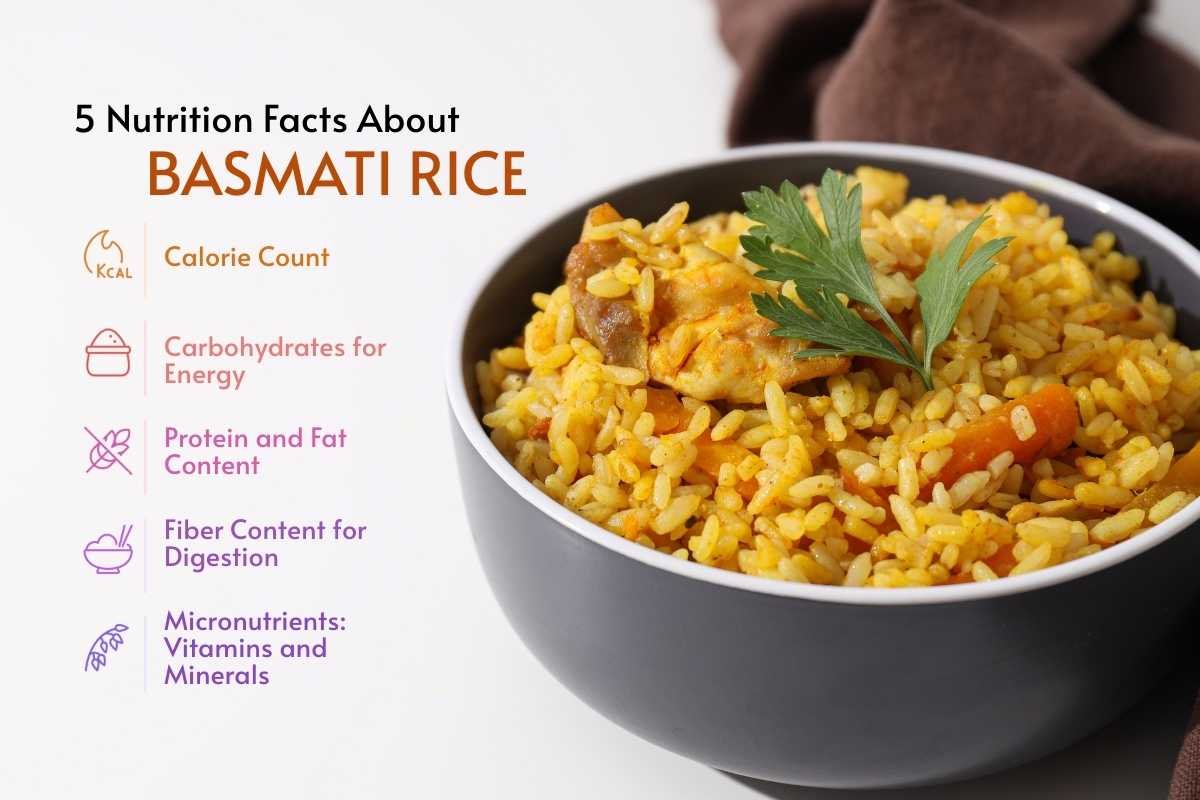
1. Calorie Count
One cup of cooked Basmati rice gives around 190-210 kcal. That’s moderate compared to richer side dishes like creamy pasta or fried potatoes. It means you can enjoy it without blowing your daily calorie budget, especially if you watch your portion size. For people trying to keep their weight stable or lose a few kilos, this makes Basmati a sensible choice. The energy comes mostly from healthy complex carbs, not heavy fats.
2. Carbohydrates for Energy
Is Basmati Rice Healthy because of its carbohydrates? Yes, each cooked cup contains 40-78 g of carbs, depending on cooking style and grain type (brown or white). These carbs are your body’s main fuel, breaking down into glucose for energy. Unlike many quick-sugar foods, Basmati releases that energy more slowly thanks to its moderate Glycemic Index (GI). That means you get steady fuel for your brain and muscles without the mid-afternoon crash.
3. Protein and Fat Content
Is Basmati Rice Healthy for protein seekers? While it’s not a protein-rich food like meat or lentils, Basmati still offers 4-7 g of plant-based protein per cup. This can help build and repair body tissues when combined with other protein sources like beans, tofu, or chicken. Fat content is very low, 0.5-1.4 g per cup, which keeps it light on the digestive system. That makes it a lean carb source, perfect for those watching fat intake.
4. Fiber Content for Digestion
Is Basmati Rice Healthy if you want better digestion? Yes, especially the brown variety. Brown Basmati rice contains about 1.3-1.5 g of fiber per cup, while white Basmati has roughly 0.5-0.7 g. Fiber adds bulk to stools, keeps you regular, and supports a healthy gut microbiome. It also helps you feel fuller for longer, which can stop you from overeating.
5. Micronutrients: Vitamins and Minerals
Is Basmati Rice Healthy when it comes to nutrients beyond carbs and calories? Absolutely. It’s a source of:
- Folate (24% DV) – supports cell growth and is essential during pregnancy.
- Thiamine (B1) – helps your body convert food into energy.
- Selenium – boosts immunity and thyroid function.
- Iron – supports oxygen transport in the blood.
- Magnesium – important for muscle and nerve function.
- Other B vitamins – play roles in metabolism and brain function.
These nutrients make Basmati more than just a “filler food”; they contribute to your overall health in real, measurable ways.
10 Health Benefits of Is Basmati Rice Healthy?
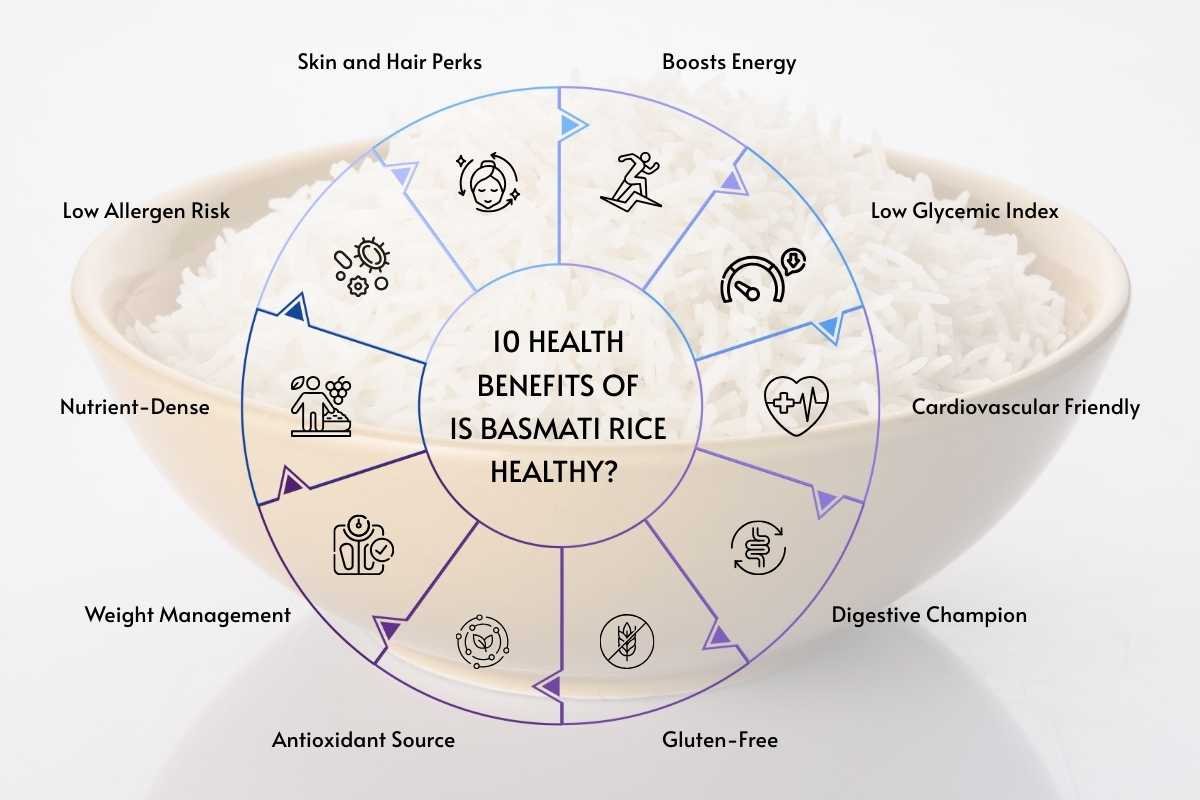
1. Boosts Energy
Is Basmati Rice Healthy for energy? Yes. It’s complex carbohydrates that release glucose slowly into the bloodstream. This means you get a steady fuel supply instead of a quick spike followed by a crash. That’s why athletes, students, and busy professionals often prefer it for lunch or dinner; it keeps them going without the afternoon slump.
2. Low Glycemic Index
Is Basmati Rice Healthy for blood sugar? Definitely. With a GI of around 50-58 for white and 45-52 for brown, it causes a slower rise in blood sugar than regular white rice. This makes it a better choice for people with diabetes or those watching their sugar levels. It’s a rice that plays nice with insulin.
3. Cardiovascular Friendly
Basmati is naturally low in fat and contains no cholesterol. This supports heart health by reducing strain on arteries. If paired with vegetables and lean proteins, it becomes part of a heart-smart diet. Is basmati rice healthy? Often gets a “yes” from cardiologists when eaten in moderation.
4. Digestive Champion
Brown Basmati rice has more fiber than its white version. Fiber helps food move smoothly through your gut, preventing constipation and keeping your digestive system in good shape. For anyone aiming for healthy digestion, is basmati rice healthy? Earns extra points here.
5. Gluten-Free
For those with gluten sensitivity or celiac disease, basmati rice is healthy? The answer is yes, it’s naturally gluten-free. You can enjoy it without worrying about triggering inflammation or digestive discomfort.
6. Antioxidant Source
Basmati rice, especially the brown variety, contains vitamins and minerals with antioxidant properties, such as magnesium and selenium. Antioxidants protect cells from damage caused by free radicals. This means is basmati rice healthy? It is also about long-term health, not just short-term energy.
7. Weight Management
Its moderate calorie count and steady energy release help you feel full for longer. That reduces the temptation to snack on high-calorie foods. Many weight-conscious diets answer whether basmati rice is healthy. With a strong “yes” when portion sizes are kept reasonable.
8. Nutrient-Dense
Basmati rice provides thiamine, niacin, magnesium, and iron. Thiamine and niacin help your body turn food into energy. Magnesium supports muscle function and nerve health. Iron aids oxygen transport in the blood. Does this nutrient profile make basmati rice healthy? Not just for the taste, but also for daily wellness.
9. Low Allergen Risk
Unlike wheat or soy, rice rarely triggers allergic reactions. For people with multiple food sensitivities, basmati rice is healthy? Because it’s a safe and gentle staple.
10. Skin and Hair Perks
B vitamins help keep your skin smooth and your hair strong. Zinc supports tissue repair and new cell growth. If you’re looking for beauty from the inside out, basmati rice is healthy. Offers subtle but steady benefits.
Also Read:
- Brown, Black, or Red? The Healthiest Types of Rice May Shock You
- Is Eating Raw Rice Safe? Here’s What You Need to Know
Is Basmati Rice Healthy for Specific Diets?
You might wonder, Is basmati rice healthy? Not just in general, but for your specific eating plan. The answer depends on your health goals and dietary needs, but in most cases, Basmati fits beautifully. Let’s break it down:
1. Diabetic Diets
When it comes to blood sugar management, is basmati rice healthy? Yes, especially compared to regular white rice. Basmati rice, particularly the brown variety, has a lower glycemic index (GI) of about 45-58. This means it causes a slower, steadier rise in blood glucose levels, helping people with type 2 diabetes or prediabetes avoid sharp sugar spikes. Paired with vegetables, lean protein, or healthy fats, it’s a smart, balanced carb choice.
2. Gluten-Free Lifestyles
For anyone living with celiac disease or gluten sensitivity, Basmati Rice is Healthy? Absolutely. It’s naturally free from gluten, so it won’t trigger digestive issues or inflammation linked to gluten-containing grains like wheat, barley, and rye. Plus, its light texture and fragrant aroma make it an easy swap in recipes where other gluten-free grains might feel too heavy.
3. Weight Loss Diets
If your goal is to drop a few pounds, is basmati rice healthy? Yes, when eaten in the right portions. It’s less sticky and slightly lower in calories than many other rice types, meaning you can enjoy satisfying meals without overloading on calories. The moderate fiber content in brown Basmati helps you feel full for longer, reducing the temptation to snack between meals. Pair it with lean proteins and vegetables for a balanced, slimming plate.
4. Vegan and Vegetarian Diets
For plant-based eaters, the question basmati rice is healthy? Gets a big yes. It’s an excellent source of complex carbohydrates, providing long-lasting energy without cholesterol or animal-based fats. Its mild flavor pairs well with lentils, beans, tofu, and a rainbow of vegetables, making it a versatile base for hearty vegan curries, stir-fries, or grain bowls.
5. Low-FODMAP Diets
People with IBS or other digestive sensitivities often ask: Is basmati rice healthy? For me? Yes, Basmati is classified as low-FODMAP, meaning it doesn’t contain fermentable carbs that can trigger bloating, cramps, or discomfort. Its easy digestibility makes it a gentle choice for sensitive stomachs, especially when served plain or with mild seasonings.
White vs Brown Basmati: Which Is Healthier?
Is Basmati Rice Healthy? Let’s compare the classic white and wholesome brown:
| Features | White Basmati | Brown Basmati |
| Processing | More processed; removes bran and germ | Minimally processed; keeps bran |
| Fiber | 0.7g/cup | 1.3g/cup |
| Glycemic Index (GI) | Medium (~58) | Lower (~50) |
| Micronutrients | Fewer minerals and vitamins | Rich in B vitamins, magnesium |
| Cooking Time | Short (~15-20min) | Longer (~40-50min) |
| Texture & Flavor | Softer, mild | Nutty, chewy, hearty |
Is Basmati Rice Healthy regardless of color? For most, yes, but brown wins on fiber and nutrients.
Basmati vs. Other Types of Rice
Is Basmati Rice Healthy compared to classics like jasmine, short-grain, or regular white rice?
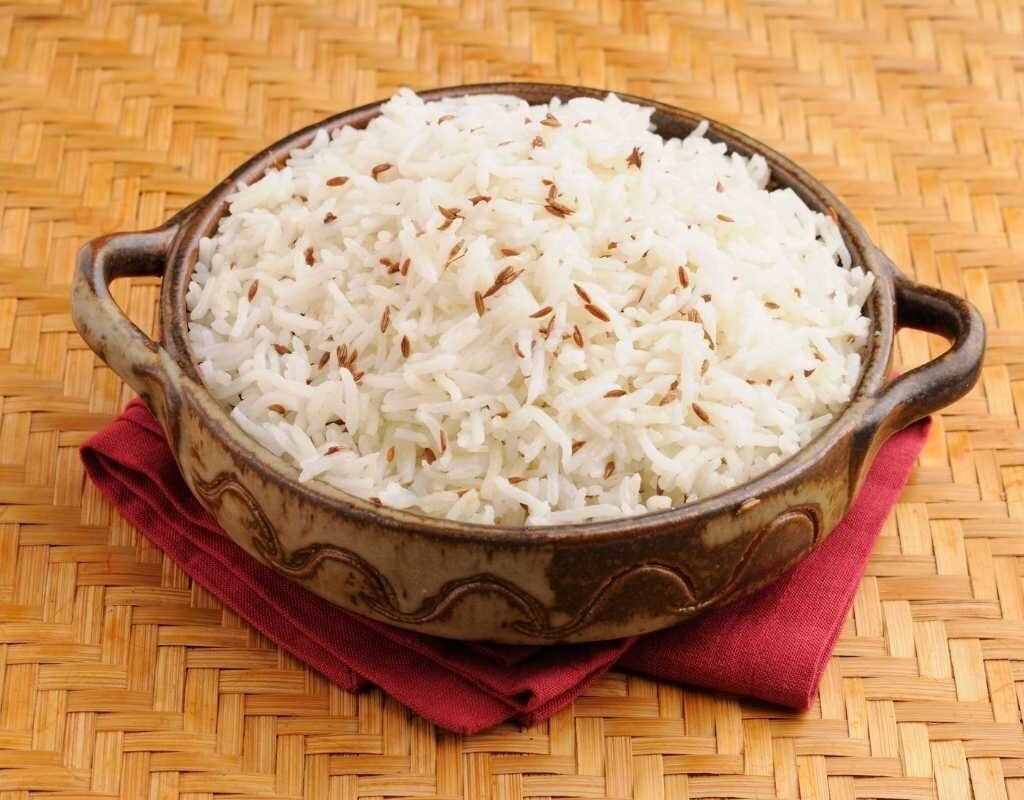
- Longer Grains and Lower Stickiness: Basmati rice is less sticky, so it’s easier on your stomach and doesn’t clump together.
- Lower GI: Its glycemic index is lower than most white and jasmine rices, helping manage blood sugar.
- Flavor and Aroma: Its nutty scent and light flavor set it apart from other common varieties.
- Nutrient Comparison: Brown basmati beats regular brown rice in aroma and rivals it in health perks thanks to higher fiber and micronutrients.
Potential Drawbacks and Considerations
Is Basmati Rice Healthy in every situation? Not always:
- Arsenic Content: Like all rice, basmati can have trace arsenic. Good news, studies suggest Indian and Pakistani basmati often have lower levels than other rice varieties.
- Low Fiber (White Variety): White basmati has much less fiber than brown, so it may not be as filling or gut-friendly.
- Calorie Density: Easy to over-serve, portion control is key if you’re counting calories.
- Environmental Concerns: Basmati farming uses water and land resources, so sourcing ethically matters.
- Allergy Risk: Rare, but possible, especially in very sensitive individuals.
Tip: Rinse basmati well before cooking and enjoy as part of a varied, colorful diet.
Expert Opinions and Scientific Research
- Nutritionists explain Is Basmati Rice is Healthy as it is high in essential nutrients and fits many dietary needs, especially when you choose the brown variety.
- The glycemic index is lower than standard white rice, with scientific research confirming basmati’s slower impact on blood sugar, making it suitable for diabetes management.
- Studies note that basmati is usually lower in arsenic compared to non-basmati rice, reducing long-term risks.
- Peer-reviewed data recommend pairing it with vegetables and proteins to maximize health benefits.
FAQs:
1. Is Basmati Rice Healthy for weight loss?
Yes, thanks to its lower glycemic index and fewer calories than other white or sticky rice, it can support weight loss goals when portioned wisely.
2. Is Basmati Rice Healthy for diabetics?
The lower GI helps regulate blood sugar better than most rice types, especially if you choose the brown variety.
3. Can kids and seniors have basmati rice?
Absolutely, unless they have a rare rice allergy. Is Basmati Rice Healthy for all ages? Generally, yes, when eaten in moderation as part of a balanced meal.
4. Does basmati rice have gluten?
No. Is Basmati Rice Healthy for gluten-free diets? Yes, it’s completely gluten-free.
5. What’s better: basmati or regular white rice?
For blood sugar and micronutrient content, basmati (especially brown) usually wins.
Conclusion
Your plate with a bow-tie now beams with confidence. You asked Is Basmati Rice Healthy? and got a cheering “yes,” especially when you choose brown, rinse smart, and watch portions. You’ve seen nutrition facts, benefits, diet fits, comparisons, and expert wisdom. Now your pantry feels like a stage where Basmati takes a healthy bow. Go ahead, cook that aromatic grain. Let your meals stay smart, fun, and vibrant, just like that bow-tie plate in your imagination.

